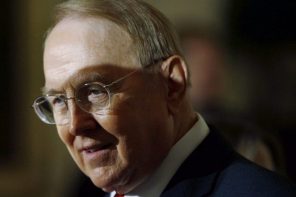On Tuesday, election night, my family and I joined tens of thousands of fellow Chicagoans in Grant Park to celebrate the historic election of Barack Obama.
But by Wednesday night, I found myself struggling just to get into my church for choir rehearsal because of the crowds at the door. Families formed a long line to sign up for a twenty-dollar “Christmas Wish” present for their children—a program coordinated through Good News Community Kitchen, the soup kitchen begun by our church that shares our storefront property.
People were reluctant to let me in the door, fearful I was cutting in line, which snaked around the block. Most had been there for hours, hoping to sign up for the present list.
Millions of American families are struggling. One-quarter of families live below the poverty line or not far above it. More than a million families are at risk of losing their homes to foreclosure. Millions more carry debts that exceed their family net worth. Unemployment is rising and employers offering basic benefits like health care are shrinking. Nearly a quarter of a million jobs were lost in the United States just in October.
The challenges American workers face getting and keeping good jobs will probably not be the first issues tackled by our new president and his team, given the meltdown of the banking industry, the severe recession, and the unresolved war in Iraq. But the religious community must provide a constant drumbeat,keeping the need to improve working conditions in the forefront, given the lines of families that are showing up at soup kitchens and holiday gift sign-ups. The workplace priorities for the religious community should be:
Stop the workplace immigration raids.
Congregations in communities struck by military-style workplace immigration raids are outraged at the disrespectful treatment of workers and the waste of federal resources. As Bishop John C. Wester, chairman of the United States Conference of Catholic Bishops’ Committee on Migration, put it (in a statement on September 10), “The humanitarian costs of these raids are immeasurable and unacceptable in a civilized society. While we do not question the right and duty of our government to enforce the law, we do question whether worksite enforcement raids are the most effective and humane method for performing this duty, particularly as they are presently being implemented.”
Create and support living-wage jobs.
The government has done little to nothing in recent years to create or support living-wage jobs. As well as insuring that workers can receive unemployment insurance, the new administration must focus on creating and supporting jobs that pay a living wage. There are many ways this can be done, but it needs to be a high priority for religious leaders facing unemployed workers in their congregations.
Stop and deter wage theft.
The wholesale stealing of workers’ wages has become a national crisis. Increasingly, religious leaders are being drawn into local efforts to help workers recover wages that have been stolen from them by unethical employers. Enforcing labor laws in meaningful ways that both stop and deter wage theft is an appropriate, and relatively easy, thing to do.
Address the crisis of uninsured workers and their families.
The religious community is very clear about the need for our society to address the crisis of workers and their families living without health coverage. Although there isn’t complete unanimity on the best approach for covering everyone, there’s wide agreement about the need for the federal government to provide leadership in addressing the crisis.
Allow workers to organize unions without fear of reprisals.
All major faith traditions believe that workers should have the right to organize unions without fear of harassment. In recent years, workers who have tried to organize have been increasingly fired, penalized or harassed for their efforts. A simple bill called the Employee Free Choice Act (EFCA) will be debated early next year. EFCA would make it easier for workers to organize unions and get first contracts, and would punish employers who violate laws concerning workers rights to organize. Religious leaders engaged in supporting low-wage workers across the country will be publicly stepping up discussions on this bill in the coming months. A number of religious forums on the bill are scheduled for December 10, International Human Rights Day.
American workers are the backbone of our congregations and the backbone of this economy. Workplace issues may not be the first ones the new president addresses, but the religious community will make sure they’re not the last.


